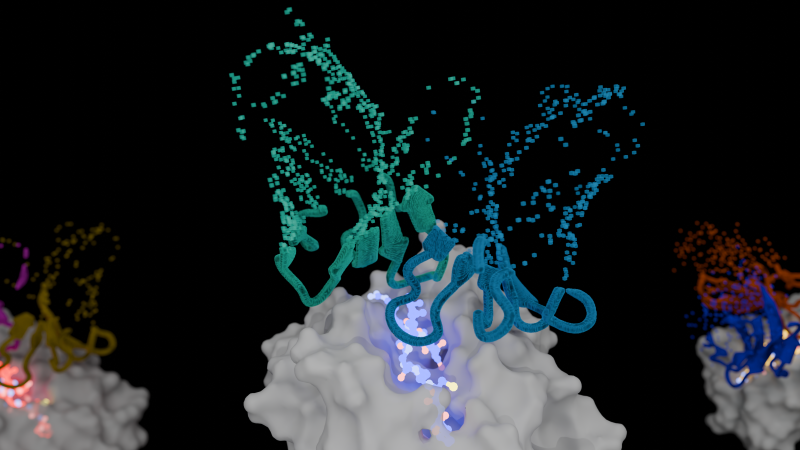The affiliation marks an important step in the consolidation of protein design and engineering as a strategic area of activity for CNPEM.

Image generated by Samuel Chagas
The Brazilian Center for Research in Energy and Materials (CNPEM) recently became affiliated with RosettaCommons, an international community led by the University of Washington and dedicated to the collaborative development of Rosetta, one of the most advanced software programs for modeling and designing proteins. Created in the laboratory of Nobel Prize winner David Baker, RosettaCommons brings together academic and scientific institutions from different countries with the aim of accelerating progress in structural biology through the continuous sharing of algorithms, data and computational advances.
The affiliation with RosettaCommons marks an important step in the consolidation of protein design and engineering as a strategic area of activity for CNPEM. To celebrate this new stage and promote scientific exchange, on July 10 the Center will host researchers Dr. Brian Pierce (University of Maryland, USA), principal investigator at RosettaCommons, and Dr. Roberto Lins (Oswaldo Cruz Foundation, Fiocruz – PE), international references in computational protein design.
The following day, July 11, they will both take part as speakers in the Symposium on Protein Design and Engineering: from Artificial Intelligence to High-Throughput Experimentation, alongside other guests such as Fernando Barroso, from the University of São Paulo, USP and Pablo Arantes from the Vita Nova Institute, as well as researchers from CNPEM itself. The event will be held in person for the Center’s employees, fellows and students, and will be broadcast online free of charge to the general public.
The program will cover recent advances in the use of artificial intelligence and experimental methods for the development and validation of proteins with biomedical and industrial applications.
Those interested in taking part in the Symposium on Protein Design and Engineering: from Artificial Intelligence to High-Throughput Experimentation can register for free until July 6 at the following link: https://cnpem.br/proteindesignsymposium/
The lectures will be given in English and the event will not be recorded.
About CNPEM
The Brazilian Center for Research in Energy and Materials (CNPEM) is a state-of-the-art, multi-user and multidisciplinary scientific environment with activities on different fronts within the Brazilian National System for Science, Technology and Innovation. A social organization overseen by the Ministry of Science, Technology and Innovation (MCTI), CNPEM is driven by research that impacts the areas of health, energy, renewable materials, and sustainability. Responsible for Sirius, the country’s largest scientific research infrastructure, CNPEM is currently constructing Project Orion, a laboratory complex for advanced pathogen research. Highly specialized science and engineering teams, sophisticated infrastructure open to the scientific community, strategic lines of investigation, innovative projects involving the productive sector, and training for researchers and students are the pillars of this institution that is unique in Brazil and able to serve as a bridge between knowledge and innovation. CNPEM is responsible for operating the Brazilian Synchrotron Light (LNLS), Biosciences (LNBio), Nanotechnology (LNNano), and Biorenewables (LNBR) National Laboratories, as well as the Ilum School of Science, which offers a bachelor’s degree program in science and technology with support from the Ministry of Education (MEC).
About LNBio
The Brazilian Biosciences National Laboratory (LNBio) is dedicated to the study of human health, combining integrative biology with advanced technologies. With competencies in gene editing, microphysiological systems, bioimaging, and tissue engineering, LNBio works to discover molecular targets and develop innovative therapies for illnesses that are of public importance. This broad approach, which includes molecules and living organisms, unravels molecular mechanisms to identify bioactive compounds that are essential to develop new active pharmaceutical ingredients. LNBio concentrates its efforts on demands from the public health system, using state-of-the-art infrastructure and a matrix work model to promote innovation and development at the crossroads between science and health. In order to integrate health with socioeconomic and environmental factors, LNBio serves as a scientific platform that is available to the government, able to develop advanced technologies that respond to strategic issues. LNBio is part of the Brazilian Center for Research in Energy and Materials (CNPEM) in Campinas, São Paulo, a private, non-profit organization overseen by the Ministry of Science, Technology, and Innovation (MCTI).







